Unit 5 Let's go ! 单元提升测试卷(含答案解析)
文档属性
| 名称 | Unit 5 Let's go ! 单元提升测试卷(含答案解析) | 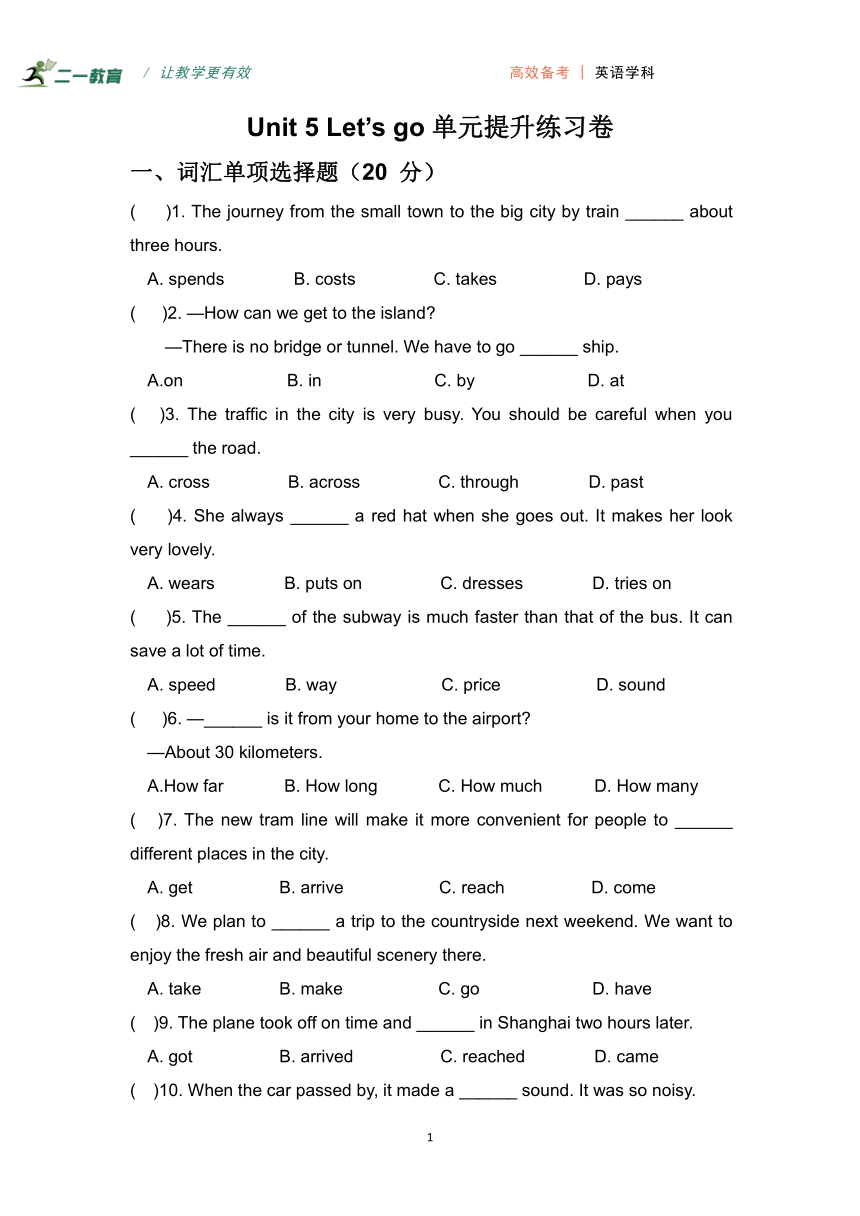 | |
| 格式 | docx | ||
| 文件大小 | 47.1KB | ||
| 资源类型 | 试卷 | ||
| 版本资源 | 外研版(三年级起点) | ||
| 科目 | 英语 | ||
| 更新时间 | 2025-07-10 08:10:25 | ||
图片预览

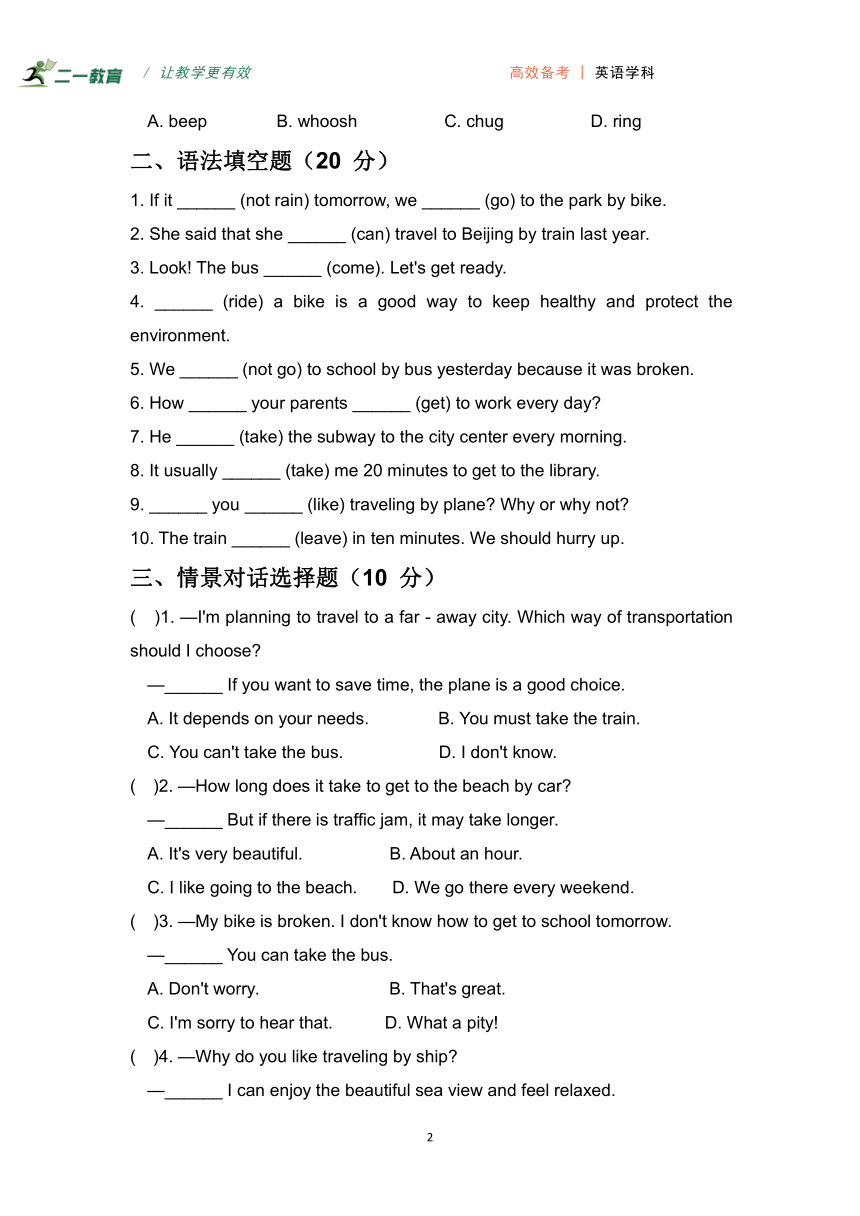
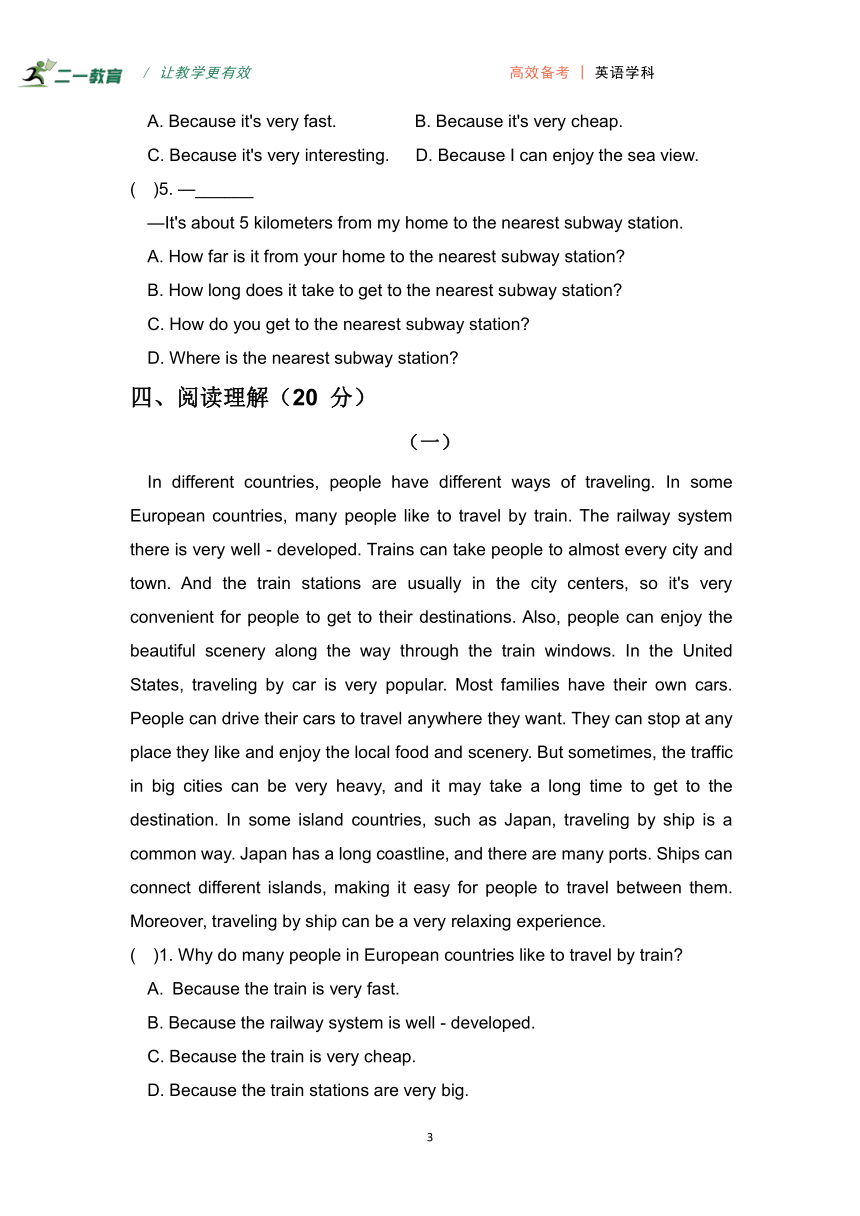
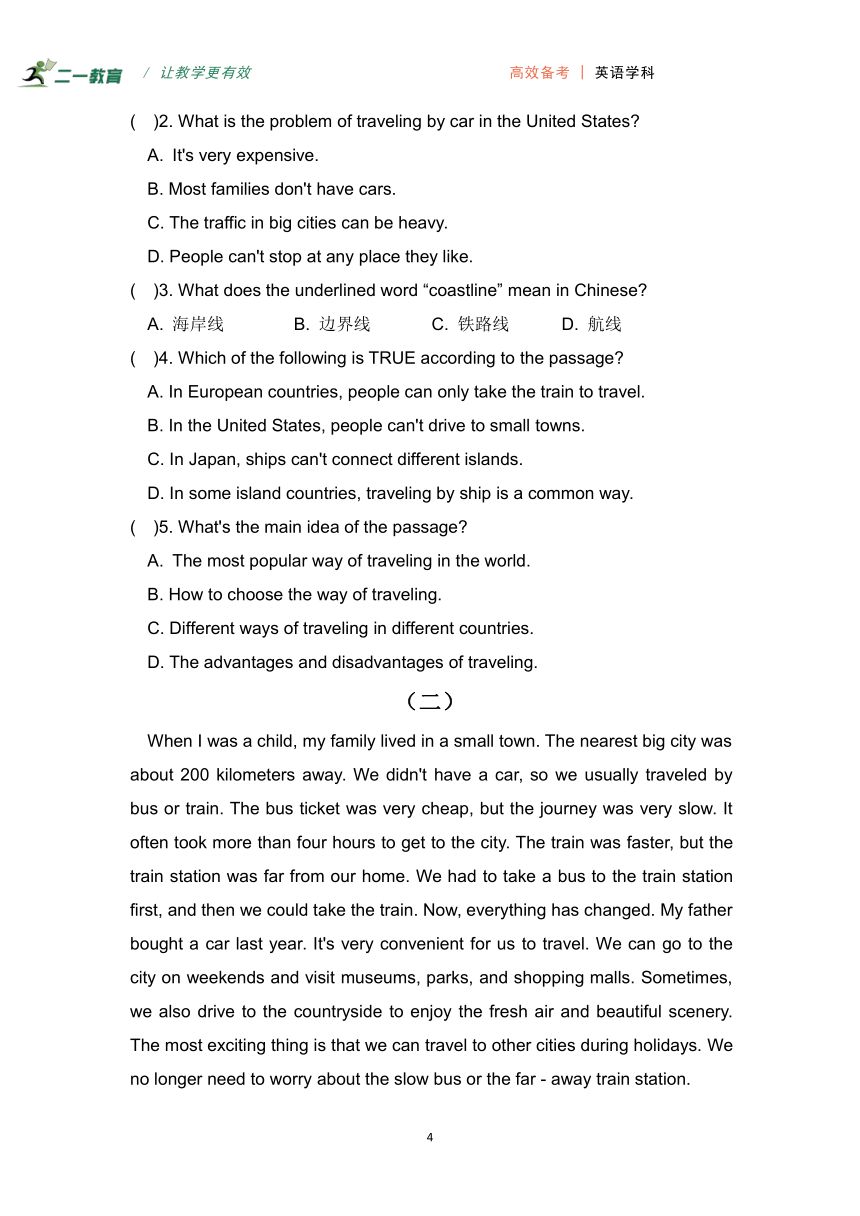
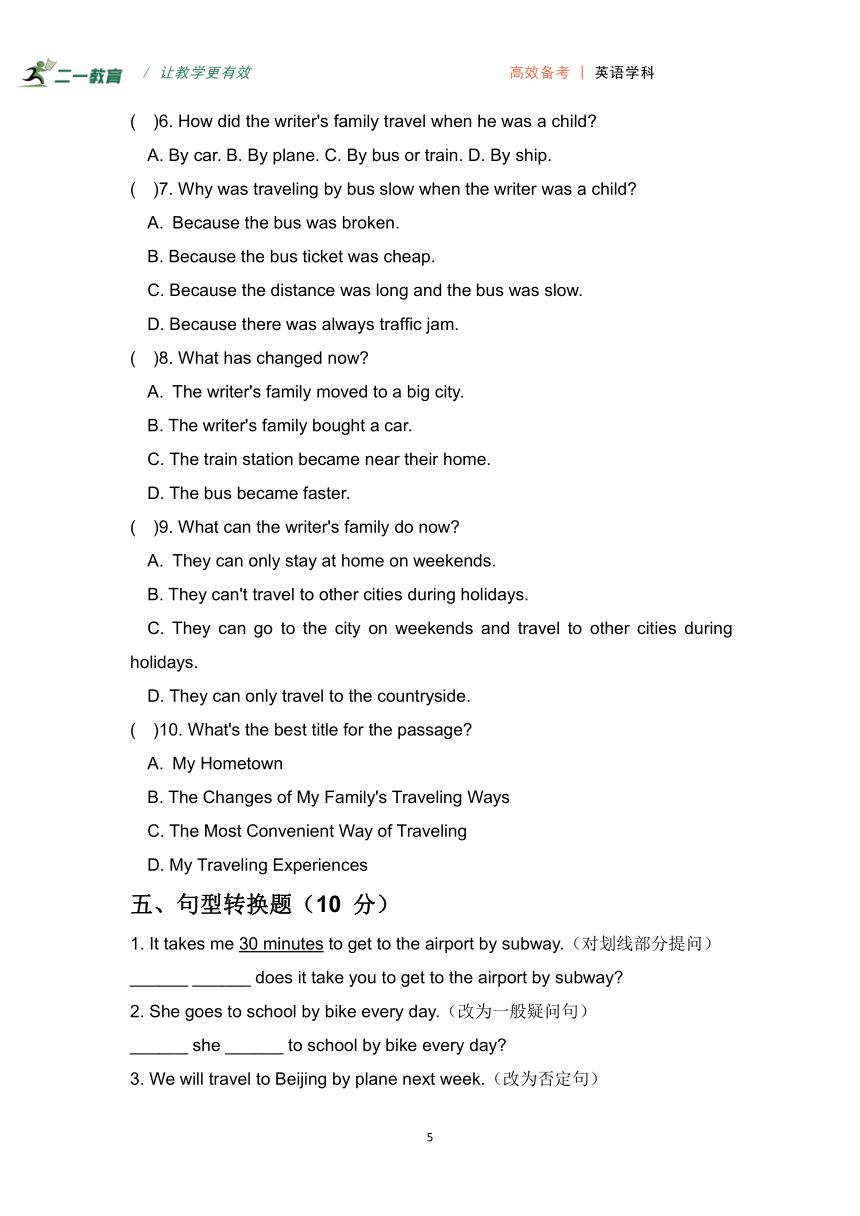
文档简介
/ 让教学更有效 高效备考 | 英语学科
Unit 5 Let’s go单元提升练习卷
一、词汇单项选择题(20 分)
( )1. The journey from the small town to the big city by train ______ about three hours.
A. spends B. costs C. takes D. pays
( )2. —How can we get to the island
—There is no bridge or tunnel. We have to go ______ ship.
A.on B. in C. by D. at
( )3. The traffic in the city is very busy. You should be careful when you ______ the road.
A. cross B. across C. through D. past
( )4. She always ______ a red hat when she goes out. It makes her look very lovely.
A. wears B. puts on C. dresses D. tries on
( )5. The ______ of the subway is much faster than that of the bus. It can save a lot of time.
A. speed B. way C. price D. sound
( )6. —______ is it from your home to the airport
—About 30 kilometers.
A.How far B. How long C. How much D. How many
( )7. The new tram line will make it more convenient for people to ______ different places in the city.
A. get B. arrive C. reach D. come
( )8. We plan to ______ a trip to the countryside next weekend. We want to enjoy the fresh air and beautiful scenery there.
A. take B. make C. go D. have
( )9. The plane took off on time and ______ in Shanghai two hours later.
A. got B. arrived C. reached D. came
( )10. When the car passed by, it made a ______ sound. It was so noisy.
A. beep B. whoosh C. chug D. ring
二、语法填空题(20 分)
1. If it ______ (not rain) tomorrow, we ______ (go) to the park by bike.
2. She said that she ______ (can) travel to Beijing by train last year.
3. Look! The bus ______ (come). Let's get ready.
4. ______ (ride) a bike is a good way to keep healthy and protect the environment.
5. We ______ (not go) to school by bus yesterday because it was broken.
6. How ______ your parents ______ (get) to work every day
7. He ______ (take) the subway to the city center every morning.
8. It usually ______ (take) me 20 minutes to get to the library.
9. ______ you ______ (like) traveling by plane Why or why not
10. The train ______ (leave) in ten minutes. We should hurry up.
三、情景对话选择题(10 分)
( )1. —I'm planning to travel to a far - away city. Which way of transportation should I choose
—______ If you want to save time, the plane is a good choice.
A. It depends on your needs. B. You must take the train.
C. You can't take the bus. D. I don't know.
( )2. —How long does it take to get to the beach by car
—______ But if there is traffic jam, it may take longer.
A. It's very beautiful. B. About an hour.
C. I like going to the beach. D. We go there every weekend.
( )3. —My bike is broken. I don't know how to get to school tomorrow.
—______ You can take the bus.
A. Don't worry. B. That's great.
C. I'm sorry to hear that. D. What a pity!
( )4. —Why do you like traveling by ship
—______ I can enjoy the beautiful sea view and feel relaxed.
A. Because it's very fast. B. Because it's very cheap.
C. Because it's very interesting. D. Because I can enjoy the sea view.
( )5. —______
—It's about 5 kilometers from my home to the nearest subway station.
A. How far is it from your home to the nearest subway station
B. How long does it take to get to the nearest subway station
C. How do you get to the nearest subway station
D. Where is the nearest subway station
四、阅读理解(20 分)
(一)
In different countries, people have different ways of traveling. In some European countries, many people like to travel by train. The railway system there is very well - developed. Trains can take people to almost every city and town. And the train stations are usually in the city centers, so it's very convenient for people to get to their destinations. Also, people can enjoy the beautiful scenery along the way through the train windows. In the United States, traveling by car is very popular. Most families have their own cars. People can drive their cars to travel anywhere they want. They can stop at any place they like and enjoy the local food and scenery. But sometimes, the traffic in big cities can be very heavy, and it may take a long time to get to the destination. In some island countries, such as Japan, traveling by ship is a common way. Japan has a long coastline, and there are many ports. Ships can connect different islands, making it easy for people to travel between them. Moreover, traveling by ship can be a very relaxing experience.
( )1. Why do many people in European countries like to travel by train
Because the train is very fast.
B. Because the railway system is well - developed.
C. Because the train is very cheap.
D. Because the train stations are very big.
( )2. What is the problem of traveling by car in the United States
It's very expensive.
B. Most families don't have cars.
C. The traffic in big cities can be heavy.
D. People can't stop at any place they like.
( )3. What does the underlined word “coastline” mean in Chinese
A. 海岸线 B. 边界线 C. 铁路线 D. 航线
( )4. Which of the following is TRUE according to the passage
A. In European countries, people can only take the train to travel.
B. In the United States, people can't drive to small towns.
C. In Japan, ships can't connect different islands.
D. In some island countries, traveling by ship is a common way.
( )5. What's the main idea of the passage
The most popular way of traveling in the world.
B. How to choose the way of traveling.
C. Different ways of traveling in different countries.
D. The advantages and disadvantages of traveling.
(二)
When I was a child, my family lived in a small town. The nearest big city was about 200 kilometers away. We didn't have a car, so we usually traveled by bus or train. The bus ticket was very cheap, but the journey was very slow. It often took more than four hours to get to the city. The train was faster, but the train station was far from our home. We had to take a bus to the train station first, and then we could take the train. Now, everything has changed. My father bought a car last year. It's very convenient for us to travel. We can go to the city on weekends and visit museums, parks, and shopping malls. Sometimes, we also drive to the countryside to enjoy the fresh air and beautiful scenery. The most exciting thing is that we can travel to other cities during holidays. We no longer need to worry about the slow bus or the far - away train station.
( )6. How did the writer's family travel when he was a child
A. By car. B. By plane. C. By bus or train. D. By ship.
( )7. Why was traveling by bus slow when the writer was a child
Because the bus was broken.
B. Because the bus ticket was cheap.
C. Because the distance was long and the bus was slow.
D. Because there was always traffic jam.
( )8. What has changed now
The writer's family moved to a big city.
B. The writer's family bought a car.
C. The train station became near their home.
D. The bus became faster.
( )9. What can the writer's family do now
They can only stay at home on weekends.
B. They can't travel to other cities during holidays.
C. They can go to the city on weekends and travel to other cities during holidays.
D. They can only travel to the countryside.
( )10. What's the best title for the passage
My Hometown
B. The Changes of My Family's Traveling Ways
C. The Most Convenient Way of Traveling
D. My Traveling Experiences
五、句型转换题(10 分)
1. It takes me 30 minutes to get to the airport by subway.(对划线部分提问)
______ ______ does it take you to get to the airport by subway
2. She goes to school by bike every day.(改为一般疑问句)
______ she ______ to school by bike every day
3. We will travel to Beijing by plane next week.(改为否定句)
We ______ ______ to Beijing by plane next week.
4. He usually arrives at school at 7:30.(改为同义句)
He usually ______ ______ school at 7:30.
5. The train leaves in an hour.(用一般现在时改写)
The train ______ at 9:00 every morning.
六、连词成句题(10 分)
1.from / it / is / how far / your home / to / the park( )
2.by / we / will / to / travel / Shanghai / plane(.)
3.takes / the journey / about / two hours / by train(.)
4.always / she / wears / a hat / when / goes out / she(.)
5.faster / the speed / of / the subway / is / than / that of / the bus(.)
七、书面表达题(10 分)
请以 “The Changes of My Traveling Ways” 为题,写一篇不少于 60 字的短文。描述你过去和现在出行方式的变化,以及这些变化给你带来的影响。
答案解析
词汇单项选择题
1. 答案:C
解析:“take” 表示 “花费(时间)”,常用于 “It takes + 时间 + to do sth.” 或 “某事 + takes + 时间” 结构,这里表示 “从小镇到大城市坐火车的旅程花费大约三小时”,所以选 C。“spend” 主语通常是人,“cost” 主语通常是物,“pay” 常与 “for” 搭配。
2. 答案:C
解析:“by + 交通工具” 表示出行方式,“by ship” 意为 “乘船”,所以选 C。
3. 答案:A
解析:“cross” 是动词,意为 “穿过”,“cross the road” 表示 “过马路”;“across” 是介词,“through” 表示从内部穿过,“past” 表示从旁边经过,所以选 A。
4. 答案:A
解析:“wear” 表示 “穿着”,强调状态;“put on” 表示 “穿上”,强调动作;“dress” 后接人,表示给某人穿衣服;“try on” 表示 “试穿”。这里表示她总是戴着一顶红帽子,强调状态,所以选 A。
5. 答案:A
解析:根据 “much faster than that of the bus” 可知说的是地铁的 “speed”(速度)比公交车快,所以选 A。“way” 方式,“price” 价格,“sound” 声音,均不符合语境。
6. 答案:A
解析:根据答语 “About 30 kilometers.” 可知询问的是距离,“How far” 用于询问距离,所以选 A。“How long” 询问时间长度或物体长度,“How much” 询问数量或价格,“How many” 询问可数名词数量。
7. 答案:C
解析:“reach” 是及物动词,直接接地点名词,表示 “到达”;“get” 要与 “to” 搭配,“arrive” 要与 “in” 或 “at” 搭配,“come” 表示 “来”,不符合语境,所以选 C。 8. 答案:A
解析:“take a trip” 是固定短语,意为 “去旅行”,所以选 A。
9. 答案:B
解析:“arrive in” 表示 “到达(大地方)”,“arrive at” 表示 “到达(小地方)”;“get” 要与 “to” 搭配,“reach” 是及物动词,后面直接接地点,“come” 表示 “来”,不符合语境,所以选 B。
10. 答案:B
解析:“whoosh” 表示 “(呼呼地)飞快移动” 时发出的声音,汽车快速经过会发出这种声音;“beep” 是汽车喇叭声,“chug” 是火车等缓慢前进的声音,“ring” 是铃声,所以选 B。
语法填空题
1. 答案:doesn't rain; will go
解析:if 引导的条件状语从句,遵循 “主将从现” 原则,从句主语 it 是第三人称单数,否定形式用 “doesn't rain”,主句用 “will go”。
2. 答案:could
解析:主句 “She said” 是一般过去时,宾语从句要用相应的过去时态,“can” 的过去式是 “could”。
3. 答案:is coming
解析:“Look!” 表明动作正在发生,用现在进行时表将来,“be + 动词 - ing”,主语 “the bus” 是第三人称单数,be 动词用 “is”,所以填 “is coming”。
4. 答案:Riding
解析:动名词短语作主语,“Riding a bike” 表示 “骑自行车”,句首首字母大写。
5. 答案:didn't go
解析:根据 “yesterday” 可知句子时态为一般过去时,“go” 是实义动词,否定形式借助助动词 “didn't”,后接动词原形。
6. 答案:do; get
解析:主语 “your parents” 是复数,一般现在时的特殊疑问句借助助动词 “do”,后接动词原形 “get”。
7. 答案:takes
解析:主语 “He” 是第三人称单数,一般现在时中动词 “take” 要用第三人称单数形式 “takes”。
8. 答案:takes
解析:主语 “It” 是第三人称单数,一般现在时中动词 “take” 要用第三人称单数形式 “takes”。
9.Do;like
解析:句子询问对方是否喜欢乘飞机旅行,是一般现在时的一般疑问句。主语 “you” 是第二人称,助动词用 “Do”,后面动词 “like” 用原形。
10.will leave
解析:“in ten minutes” 表示 “十分钟后”,是将来时间,句子用一般将来时,结构为 “will + 动词原形”,所以填 “will leave”。
三、情景对话选择题
1.A
解析:问句询问去远城市该选哪种交通方式,答句提到 “如果想节省时间,飞机是好选择”,说明要根据需求决定。A 选项 “这取决于你的需求” 符合语境;B、C 选项过于绝对;D 选项不符合交际逻辑。
2.B
解析:问句询问开车到海滩需要多久,答句应回答时间。B 选项 “大约一小时” 符合;A 讲海滩美景,C 说喜欢去海滩,D 说每周去,均与时间无关。
3.A
解析:对方说自行车坏了,不知明天怎么上学,答句应给予安慰并提供建议。A 选项 “别担心” 符合;B “太好了”、C “听到这个很抱歉”、D “真可惜” 均不符合语境。
4.D
解析:问句问为什么喜欢乘船旅行,答句应说明原因,且要与 “享受海景、放松” 一致。D 选项 “因为我能欣赏海景” 直接呼应;A 说快,B 说便宜,C 说有趣,均不贴合后文描述。
5.A
解析:答句说 “从家到最近的地铁站大约 5 公里”,是距离,问句应问距离。A 选项 “从你家到最近的地铁站有多远” 符合;B 问时间,C 问方式,D 问地点,均不符。
四、阅读理解
(一)
1.B
解析:文中提到 “In some European countries, many people like to travel by train. The railway system there is very well-developed.”,可知欧洲人喜欢乘火车是因为铁路系统发达,选 B。
2.C
解析:文中说 “In the United States...But sometimes, the traffic in big cities can be very heavy”,可知美国开车旅行的问题是大城市交通拥堵,选 C。
3.A
解析:日本是岛国,有很多港口,“coastline” 结合 “long” 和 “ports”(港口),可推测是 “海岸线”,选 A。
4.D
解析:A 选项 “only take the train” 错误,文中说 “many people like” 并非唯一方式;B 选项 “can't drive to small towns” 错误,文中说 “can drive...anywhere”;C 选项 “can't connect” 错误,文中说 “Ships can connect different islands”;D 选项与文中 “In some island countries...traveling by ship is a common way” 一致,选 D。
5.C
解析:文章分别讲了欧洲、美国、岛国(如日本)不同的旅行方式,主旨是 “不同国家的不同旅行方式”,选 C。
(二)
6. C
解析:文中明确说 “When I was a child...we usually traveled by bus or train”,选 C。
7.C
解析:文中提到小镇到大城市约 200 公里,且 “the journey was very slow”,可知是距离远且巴士慢导致的,选 C;A 未提及,B 是巴士的优点,D 文中无交通拥堵描述。
8.B
解析:文中说 “Now, everything has changed. My father bought a car last year”,可知变化是家里买了车,选 B;A、C、D 均未提及。
9.C
解析:文中提到现在 “can go to the city on weekends” 且 “can travel to other cities during holidays”,C 选项符合;A、B、D 均与原文不符。
10.B
解析:文章主要讲了作者家过去乘巴士或火车旅行,现在开车旅行的变化,B 选项 “我家旅行方式的变化” 最贴合;A 讲家乡,C 讲最方便的交通方式,D 讲旅行经历,均不全面。
五、句型转换题
1.How long
解析:划线部分 “30 minutes” 是时间长度,对时间长度提问用 “How long”。
2.Does;go
解析:原句是一般现在时,主语 “she” 是第三人称单数,改为一般疑问句用助动词 “Does”,后面动词 “goes” 变回原形 “go”。
3.won't travel
解析:原句是一般将来时 “will travel”,改为否定句在 “will” 后加 “not”,缩写为 “won't”,动词 “travel” 用原形。
4.gets to
解析:“arrive at” 与 “get to” 都表示 “到达”,主语 “he” 是第三人称单数,“get” 用 “gets”,所以填 “gets to”。
5.leaves
解析:一般现在时中,主语 “the train” 是第三人称单数,动词 “leave” 用第三人称单数形式 “leaves”。
六、连词成句题
1.How far is it from your home to the park
解析:“how far” 是特殊疑问词,放在句首,“it” 作形式主语,“from your home to the park” 是地点状语,按疑问句语序连接,句末用问号。
2.We will travel to Shanghai by plane.
解析:“we” 是主语,“will travel to Shanghai” 是 “将去上海旅行”,“by plane” 是方式状语,按主谓宾 + 状语顺序连接。
3.The journey by train takes about two hours.
解析:“the journey by train” 是主语,“takes about two hours” 表示 “花费约两小时”,按主谓结构连接。
4.She always wears a hat when she goes out.
解析:“she” 是主语,“always wears a hat” 是主句,“when she goes out” 是时间状语从句,按主句 + 从句顺序连接。
5.The speed of the subway is faster than that of the bus.
解析:这是比较级句子,“the speed of the subway” 与 “that of the bus” 对比,“faster than” 连接,按比较结构排列。
七、书面表达题参考范文
The Changes of My Traveling Ways
When I was little, I often went to the park with my mom by bus. The bus was slow, but I could talk with mom on the way.
Now, my dad has a car. We go to the park by car. It's fast, and we don't need to wait for the bus. Sometimes, we even drive to the zoo on weekends.
These changes make me happy. I can go to more places easily. I like the new way of traveling.
Unit 5 Let’s go单元提升练习卷
一、词汇单项选择题(20 分)
( )1. The journey from the small town to the big city by train ______ about three hours.
A. spends B. costs C. takes D. pays
( )2. —How can we get to the island
—There is no bridge or tunnel. We have to go ______ ship.
A.on B. in C. by D. at
( )3. The traffic in the city is very busy. You should be careful when you ______ the road.
A. cross B. across C. through D. past
( )4. She always ______ a red hat when she goes out. It makes her look very lovely.
A. wears B. puts on C. dresses D. tries on
( )5. The ______ of the subway is much faster than that of the bus. It can save a lot of time.
A. speed B. way C. price D. sound
( )6. —______ is it from your home to the airport
—About 30 kilometers.
A.How far B. How long C. How much D. How many
( )7. The new tram line will make it more convenient for people to ______ different places in the city.
A. get B. arrive C. reach D. come
( )8. We plan to ______ a trip to the countryside next weekend. We want to enjoy the fresh air and beautiful scenery there.
A. take B. make C. go D. have
( )9. The plane took off on time and ______ in Shanghai two hours later.
A. got B. arrived C. reached D. came
( )10. When the car passed by, it made a ______ sound. It was so noisy.
A. beep B. whoosh C. chug D. ring
二、语法填空题(20 分)
1. If it ______ (not rain) tomorrow, we ______ (go) to the park by bike.
2. She said that she ______ (can) travel to Beijing by train last year.
3. Look! The bus ______ (come). Let's get ready.
4. ______ (ride) a bike is a good way to keep healthy and protect the environment.
5. We ______ (not go) to school by bus yesterday because it was broken.
6. How ______ your parents ______ (get) to work every day
7. He ______ (take) the subway to the city center every morning.
8. It usually ______ (take) me 20 minutes to get to the library.
9. ______ you ______ (like) traveling by plane Why or why not
10. The train ______ (leave) in ten minutes. We should hurry up.
三、情景对话选择题(10 分)
( )1. —I'm planning to travel to a far - away city. Which way of transportation should I choose
—______ If you want to save time, the plane is a good choice.
A. It depends on your needs. B. You must take the train.
C. You can't take the bus. D. I don't know.
( )2. —How long does it take to get to the beach by car
—______ But if there is traffic jam, it may take longer.
A. It's very beautiful. B. About an hour.
C. I like going to the beach. D. We go there every weekend.
( )3. —My bike is broken. I don't know how to get to school tomorrow.
—______ You can take the bus.
A. Don't worry. B. That's great.
C. I'm sorry to hear that. D. What a pity!
( )4. —Why do you like traveling by ship
—______ I can enjoy the beautiful sea view and feel relaxed.
A. Because it's very fast. B. Because it's very cheap.
C. Because it's very interesting. D. Because I can enjoy the sea view.
( )5. —______
—It's about 5 kilometers from my home to the nearest subway station.
A. How far is it from your home to the nearest subway station
B. How long does it take to get to the nearest subway station
C. How do you get to the nearest subway station
D. Where is the nearest subway station
四、阅读理解(20 分)
(一)
In different countries, people have different ways of traveling. In some European countries, many people like to travel by train. The railway system there is very well - developed. Trains can take people to almost every city and town. And the train stations are usually in the city centers, so it's very convenient for people to get to their destinations. Also, people can enjoy the beautiful scenery along the way through the train windows. In the United States, traveling by car is very popular. Most families have their own cars. People can drive their cars to travel anywhere they want. They can stop at any place they like and enjoy the local food and scenery. But sometimes, the traffic in big cities can be very heavy, and it may take a long time to get to the destination. In some island countries, such as Japan, traveling by ship is a common way. Japan has a long coastline, and there are many ports. Ships can connect different islands, making it easy for people to travel between them. Moreover, traveling by ship can be a very relaxing experience.
( )1. Why do many people in European countries like to travel by train
Because the train is very fast.
B. Because the railway system is well - developed.
C. Because the train is very cheap.
D. Because the train stations are very big.
( )2. What is the problem of traveling by car in the United States
It's very expensive.
B. Most families don't have cars.
C. The traffic in big cities can be heavy.
D. People can't stop at any place they like.
( )3. What does the underlined word “coastline” mean in Chinese
A. 海岸线 B. 边界线 C. 铁路线 D. 航线
( )4. Which of the following is TRUE according to the passage
A. In European countries, people can only take the train to travel.
B. In the United States, people can't drive to small towns.
C. In Japan, ships can't connect different islands.
D. In some island countries, traveling by ship is a common way.
( )5. What's the main idea of the passage
The most popular way of traveling in the world.
B. How to choose the way of traveling.
C. Different ways of traveling in different countries.
D. The advantages and disadvantages of traveling.
(二)
When I was a child, my family lived in a small town. The nearest big city was about 200 kilometers away. We didn't have a car, so we usually traveled by bus or train. The bus ticket was very cheap, but the journey was very slow. It often took more than four hours to get to the city. The train was faster, but the train station was far from our home. We had to take a bus to the train station first, and then we could take the train. Now, everything has changed. My father bought a car last year. It's very convenient for us to travel. We can go to the city on weekends and visit museums, parks, and shopping malls. Sometimes, we also drive to the countryside to enjoy the fresh air and beautiful scenery. The most exciting thing is that we can travel to other cities during holidays. We no longer need to worry about the slow bus or the far - away train station.
( )6. How did the writer's family travel when he was a child
A. By car. B. By plane. C. By bus or train. D. By ship.
( )7. Why was traveling by bus slow when the writer was a child
Because the bus was broken.
B. Because the bus ticket was cheap.
C. Because the distance was long and the bus was slow.
D. Because there was always traffic jam.
( )8. What has changed now
The writer's family moved to a big city.
B. The writer's family bought a car.
C. The train station became near their home.
D. The bus became faster.
( )9. What can the writer's family do now
They can only stay at home on weekends.
B. They can't travel to other cities during holidays.
C. They can go to the city on weekends and travel to other cities during holidays.
D. They can only travel to the countryside.
( )10. What's the best title for the passage
My Hometown
B. The Changes of My Family's Traveling Ways
C. The Most Convenient Way of Traveling
D. My Traveling Experiences
五、句型转换题(10 分)
1. It takes me 30 minutes to get to the airport by subway.(对划线部分提问)
______ ______ does it take you to get to the airport by subway
2. She goes to school by bike every day.(改为一般疑问句)
______ she ______ to school by bike every day
3. We will travel to Beijing by plane next week.(改为否定句)
We ______ ______ to Beijing by plane next week.
4. He usually arrives at school at 7:30.(改为同义句)
He usually ______ ______ school at 7:30.
5. The train leaves in an hour.(用一般现在时改写)
The train ______ at 9:00 every morning.
六、连词成句题(10 分)
1.from / it / is / how far / your home / to / the park( )
2.by / we / will / to / travel / Shanghai / plane(.)
3.takes / the journey / about / two hours / by train(.)
4.always / she / wears / a hat / when / goes out / she(.)
5.faster / the speed / of / the subway / is / than / that of / the bus(.)
七、书面表达题(10 分)
请以 “The Changes of My Traveling Ways” 为题,写一篇不少于 60 字的短文。描述你过去和现在出行方式的变化,以及这些变化给你带来的影响。
答案解析
词汇单项选择题
1. 答案:C
解析:“take” 表示 “花费(时间)”,常用于 “It takes + 时间 + to do sth.” 或 “某事 + takes + 时间” 结构,这里表示 “从小镇到大城市坐火车的旅程花费大约三小时”,所以选 C。“spend” 主语通常是人,“cost” 主语通常是物,“pay” 常与 “for” 搭配。
2. 答案:C
解析:“by + 交通工具” 表示出行方式,“by ship” 意为 “乘船”,所以选 C。
3. 答案:A
解析:“cross” 是动词,意为 “穿过”,“cross the road” 表示 “过马路”;“across” 是介词,“through” 表示从内部穿过,“past” 表示从旁边经过,所以选 A。
4. 答案:A
解析:“wear” 表示 “穿着”,强调状态;“put on” 表示 “穿上”,强调动作;“dress” 后接人,表示给某人穿衣服;“try on” 表示 “试穿”。这里表示她总是戴着一顶红帽子,强调状态,所以选 A。
5. 答案:A
解析:根据 “much faster than that of the bus” 可知说的是地铁的 “speed”(速度)比公交车快,所以选 A。“way” 方式,“price” 价格,“sound” 声音,均不符合语境。
6. 答案:A
解析:根据答语 “About 30 kilometers.” 可知询问的是距离,“How far” 用于询问距离,所以选 A。“How long” 询问时间长度或物体长度,“How much” 询问数量或价格,“How many” 询问可数名词数量。
7. 答案:C
解析:“reach” 是及物动词,直接接地点名词,表示 “到达”;“get” 要与 “to” 搭配,“arrive” 要与 “in” 或 “at” 搭配,“come” 表示 “来”,不符合语境,所以选 C。 8. 答案:A
解析:“take a trip” 是固定短语,意为 “去旅行”,所以选 A。
9. 答案:B
解析:“arrive in” 表示 “到达(大地方)”,“arrive at” 表示 “到达(小地方)”;“get” 要与 “to” 搭配,“reach” 是及物动词,后面直接接地点,“come” 表示 “来”,不符合语境,所以选 B。
10. 答案:B
解析:“whoosh” 表示 “(呼呼地)飞快移动” 时发出的声音,汽车快速经过会发出这种声音;“beep” 是汽车喇叭声,“chug” 是火车等缓慢前进的声音,“ring” 是铃声,所以选 B。
语法填空题
1. 答案:doesn't rain; will go
解析:if 引导的条件状语从句,遵循 “主将从现” 原则,从句主语 it 是第三人称单数,否定形式用 “doesn't rain”,主句用 “will go”。
2. 答案:could
解析:主句 “She said” 是一般过去时,宾语从句要用相应的过去时态,“can” 的过去式是 “could”。
3. 答案:is coming
解析:“Look!” 表明动作正在发生,用现在进行时表将来,“be + 动词 - ing”,主语 “the bus” 是第三人称单数,be 动词用 “is”,所以填 “is coming”。
4. 答案:Riding
解析:动名词短语作主语,“Riding a bike” 表示 “骑自行车”,句首首字母大写。
5. 答案:didn't go
解析:根据 “yesterday” 可知句子时态为一般过去时,“go” 是实义动词,否定形式借助助动词 “didn't”,后接动词原形。
6. 答案:do; get
解析:主语 “your parents” 是复数,一般现在时的特殊疑问句借助助动词 “do”,后接动词原形 “get”。
7. 答案:takes
解析:主语 “He” 是第三人称单数,一般现在时中动词 “take” 要用第三人称单数形式 “takes”。
8. 答案:takes
解析:主语 “It” 是第三人称单数,一般现在时中动词 “take” 要用第三人称单数形式 “takes”。
9.Do;like
解析:句子询问对方是否喜欢乘飞机旅行,是一般现在时的一般疑问句。主语 “you” 是第二人称,助动词用 “Do”,后面动词 “like” 用原形。
10.will leave
解析:“in ten minutes” 表示 “十分钟后”,是将来时间,句子用一般将来时,结构为 “will + 动词原形”,所以填 “will leave”。
三、情景对话选择题
1.A
解析:问句询问去远城市该选哪种交通方式,答句提到 “如果想节省时间,飞机是好选择”,说明要根据需求决定。A 选项 “这取决于你的需求” 符合语境;B、C 选项过于绝对;D 选项不符合交际逻辑。
2.B
解析:问句询问开车到海滩需要多久,答句应回答时间。B 选项 “大约一小时” 符合;A 讲海滩美景,C 说喜欢去海滩,D 说每周去,均与时间无关。
3.A
解析:对方说自行车坏了,不知明天怎么上学,答句应给予安慰并提供建议。A 选项 “别担心” 符合;B “太好了”、C “听到这个很抱歉”、D “真可惜” 均不符合语境。
4.D
解析:问句问为什么喜欢乘船旅行,答句应说明原因,且要与 “享受海景、放松” 一致。D 选项 “因为我能欣赏海景” 直接呼应;A 说快,B 说便宜,C 说有趣,均不贴合后文描述。
5.A
解析:答句说 “从家到最近的地铁站大约 5 公里”,是距离,问句应问距离。A 选项 “从你家到最近的地铁站有多远” 符合;B 问时间,C 问方式,D 问地点,均不符。
四、阅读理解
(一)
1.B
解析:文中提到 “In some European countries, many people like to travel by train. The railway system there is very well-developed.”,可知欧洲人喜欢乘火车是因为铁路系统发达,选 B。
2.C
解析:文中说 “In the United States...But sometimes, the traffic in big cities can be very heavy”,可知美国开车旅行的问题是大城市交通拥堵,选 C。
3.A
解析:日本是岛国,有很多港口,“coastline” 结合 “long” 和 “ports”(港口),可推测是 “海岸线”,选 A。
4.D
解析:A 选项 “only take the train” 错误,文中说 “many people like” 并非唯一方式;B 选项 “can't drive to small towns” 错误,文中说 “can drive...anywhere”;C 选项 “can't connect” 错误,文中说 “Ships can connect different islands”;D 选项与文中 “In some island countries...traveling by ship is a common way” 一致,选 D。
5.C
解析:文章分别讲了欧洲、美国、岛国(如日本)不同的旅行方式,主旨是 “不同国家的不同旅行方式”,选 C。
(二)
6. C
解析:文中明确说 “When I was a child...we usually traveled by bus or train”,选 C。
7.C
解析:文中提到小镇到大城市约 200 公里,且 “the journey was very slow”,可知是距离远且巴士慢导致的,选 C;A 未提及,B 是巴士的优点,D 文中无交通拥堵描述。
8.B
解析:文中说 “Now, everything has changed. My father bought a car last year”,可知变化是家里买了车,选 B;A、C、D 均未提及。
9.C
解析:文中提到现在 “can go to the city on weekends” 且 “can travel to other cities during holidays”,C 选项符合;A、B、D 均与原文不符。
10.B
解析:文章主要讲了作者家过去乘巴士或火车旅行,现在开车旅行的变化,B 选项 “我家旅行方式的变化” 最贴合;A 讲家乡,C 讲最方便的交通方式,D 讲旅行经历,均不全面。
五、句型转换题
1.How long
解析:划线部分 “30 minutes” 是时间长度,对时间长度提问用 “How long”。
2.Does;go
解析:原句是一般现在时,主语 “she” 是第三人称单数,改为一般疑问句用助动词 “Does”,后面动词 “goes” 变回原形 “go”。
3.won't travel
解析:原句是一般将来时 “will travel”,改为否定句在 “will” 后加 “not”,缩写为 “won't”,动词 “travel” 用原形。
4.gets to
解析:“arrive at” 与 “get to” 都表示 “到达”,主语 “he” 是第三人称单数,“get” 用 “gets”,所以填 “gets to”。
5.leaves
解析:一般现在时中,主语 “the train” 是第三人称单数,动词 “leave” 用第三人称单数形式 “leaves”。
六、连词成句题
1.How far is it from your home to the park
解析:“how far” 是特殊疑问词,放在句首,“it” 作形式主语,“from your home to the park” 是地点状语,按疑问句语序连接,句末用问号。
2.We will travel to Shanghai by plane.
解析:“we” 是主语,“will travel to Shanghai” 是 “将去上海旅行”,“by plane” 是方式状语,按主谓宾 + 状语顺序连接。
3.The journey by train takes about two hours.
解析:“the journey by train” 是主语,“takes about two hours” 表示 “花费约两小时”,按主谓结构连接。
4.She always wears a hat when she goes out.
解析:“she” 是主语,“always wears a hat” 是主句,“when she goes out” 是时间状语从句,按主句 + 从句顺序连接。
5.The speed of the subway is faster than that of the bus.
解析:这是比较级句子,“the speed of the subway” 与 “that of the bus” 对比,“faster than” 连接,按比较结构排列。
七、书面表达题参考范文
The Changes of My Traveling Ways
When I was little, I often went to the park with my mom by bus. The bus was slow, but I could talk with mom on the way.
Now, my dad has a car. We go to the park by car. It's fast, and we don't need to wait for the bus. Sometimes, we even drive to the zoo on weekends.
These changes make me happy. I can go to more places easily. I like the new way of traveling.
同课章节目录
